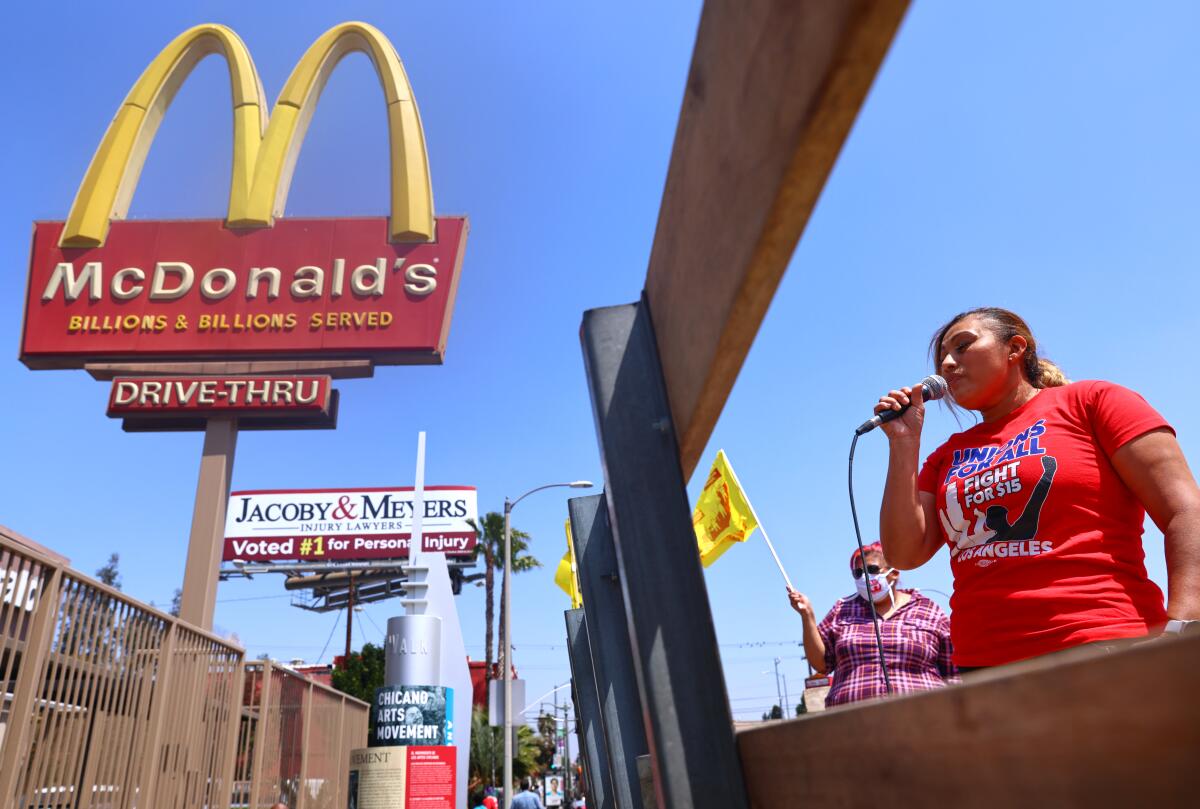How a new California law for fast-food workers can set a path for industries nationwide

- Share via
The California Legislature has just passed one of the most significant pieces of employment legislation in a generation. Assembly Bill 257, which builds on Progressive and New Deal-era legislation in the United States and successful models abroad, gives fast-food workers a collective voice in determining their working conditions on an industrywide basis.
It creates a process — a new “council” — for fast-food workers and their employers to come together, along with government officials, to raise wages and improve working conditions in all California restaurants affiliated with large fast-food chains. Gov. Gavin Newsom should sign the bill and then it should be used it as a model for reforms across industries and around the country.
For years now, under the banner of the Fight for $15, fast-food workers have been fighting for higher wages, better working conditions and union representation. They have organized countless protests and strikes and successfully pushed legislators to raise minimum wages across the country. But with few exceptions, they haven’t yet been able to win unions or collective bargaining agreements, which would give them an essential voice on the job.
The core problem is that U.S. labor law channels organizing and bargaining rights to the individual worksite, while making those rights extremely hard to exercise. In order for fast-food workers to win a union contract, a majority of workers at a given store need to vote to unionize. But employers have many ways to block or delay unionization, and they face few penalties when they violate the law and retaliate against workers who organize.
Even if the workers win a union election, as many Starbucks workers recently have, the employer is typically obligated to negotiate only on a store-by-store basis. Despite the legal obligation to bargain in good faith, many employers stall for years. The problem is worse for workers who are employed by franchisees, like most McDonald’s workers are. The only entity obligated to bargain is the owner of their local franchise. Yet the franchisee generally doesn’t set the rules — the corporate entity does.
This system of bargaining was designed when large factories predominated, as was the case in the mid-20th century with auto and steel. It worked relatively well for a while, at least for those workers who were included (largely white men). But even then, workers understood that they needed to set standards at the industry level. Through strikes and protests, they persuaded employers to engage not only in worksite bargaining, but also in what was known as “pattern bargaining,” which created a set of wage and benefit standards to be replicated throughout the industry.
In today’s economy, the system of worksite-by-worksite bargaining makes little sense. Many people are employed by large corporations that have hundreds of small locations. Others are employed by franchisees, contractors or suppliers. Even unionized workers end up atomized: They have a right to bargain in one worksite, but that is just not enough to counterbalance the power of the corporation that controls their job.
In the last few years, growing worker movements have begun to demand changes in this flawed system. Fast-food workers, home care workers, teachers and others have been demanding higher wages and a union, not just at their workplaces but for all workers in their industries. These worker movements are marking a path toward a system that would provide rights to all workers to bargain at a sectoral level.
Most industrial democracies have a sectoral bargaining system, including nearly all countries in Europe. Experience shows that sectoral bargaining, when paired with strong, democratic unions, has significant advantages.
Among other things, researchers have found that industrywide collective bargaining coverage tends to reduce economic inequality and close pay gaps, without hurting economic growth. Under such a system, employers no longer face pressure to secure a competitive advantage by lowering wages and violating labor laws. Instead, they compete based on the quality of their products and services.
AB 257 does not create a sectoral bargaining system, because the federal National Labor Relations Act preempts states from enacting broad labor law reforms.
But California does have the authority to create a system for industrywide standard setting. That’s what AB 257 does. It gives workers a voice in their working conditions and how their industry will be governed. It creates a 10-member council with two worker representatives, two worker advocates, two government representatives, two representatives of franchisors and two representatives of franchisees. The council can be called into action when 10,000 workers sign a petition. It is empowered to establish minimum pay and safety conditions on an industrywide basis. The Legislature will be given time to review and potentially block any council-set standards.
AB 257 is not novel, even within the United States. It is a stronger version of the largely forgotten “industry committees,” or wage boards, that existed in the early 20th century at both the state and federal levels. For example, in the 1930s and ’40s, Fair Labor Standards Act industry committees successfully raised wages for millions of American workers and gave them a greater voice.
AB 257 improves upon these old laws, fixing some of their flaws. And it provides more guardrails and direction, for example, requiring the council to conduct a review of the adequacy of minimum fast-food restaurant health, safety and employment standards at least once every three years. To be sure, the bill could be stronger still. In response to industry lobbying, legislators stripped out provisions that would have made corporate franchisors jointly liable for employment law violations committed by their franchisees.
In the end, AB 257 will not solve all the problems with the fast-food worker industry. But it is an important step in the right direction, giving workers a voice in their industry and providing a model for a system of labor law that makes sense in our economy.
Kate Andrias is a professor at Columbia Law School. She teaches courses on labor law and constitutional law.
More to Read
A cure for the common opinion
Get thought-provoking perspectives with our weekly newsletter.
You may occasionally receive promotional content from the Los Angeles Times.









